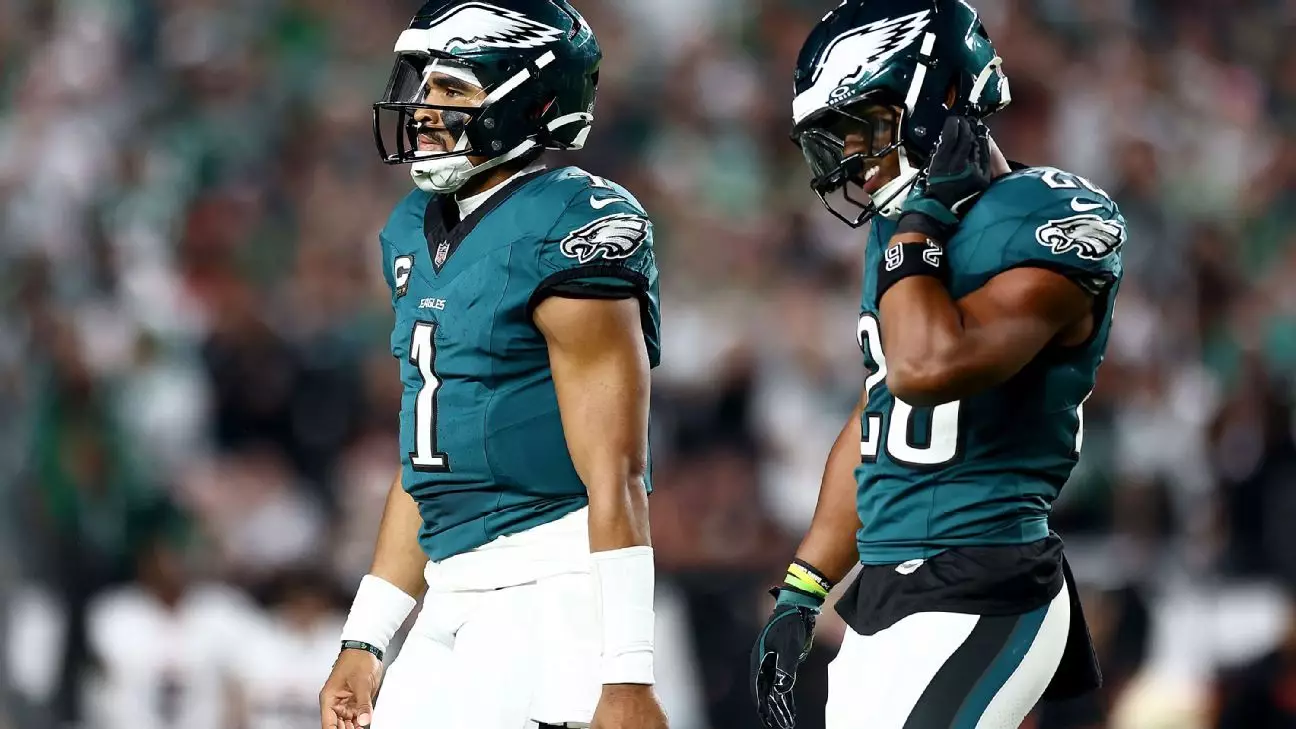The tension and stakes of National Football League (NFL) games can induce both player excellence and catastrophic failure. The Philadelphia Eagles’ recent narrow loss to the Atlanta Falcons serves as a stark reminder of the fine line professional athletes walk between triumph and disappointment. The aftermath of this contest spotlighted running back Saquon Barkley, whose late-game drop became the flashpoint of criticism and self-reflection, resonating throughout the sports community.
As the clock wound down and the Eagles clung to a slim three-point lead, a critical moment arrived. It was third-and-3 from the Falcons’ ten-yard line, and victory seemed within reach. Quarterback Jalen Hurts, deftly evading defenders, located Barkley in the flat. The pass was accurate, and the opportunity for a first down was ripe. However, the ball slipped through Barkley’s fingers, ricocheting away and ending the immediate chance to seal the game. The Eagles, facing a new challenge, opted instead for a field goal, leaving Atlanta ample time for a counterattack.
In the final moments of the game, the Eagles’ decision to forego a run-and-chance paired with Barkley’s critical drop set the stage for an unexpected Falcons comeback. Without the confidence-boosting first down, Philadelphia allowed Kirk Cousins to connect with Drake London for the game-winning touchdown. Such moments not only shape the outcome of the game but also echo in the minds of players long after the final whistle blows.
Post-game, Barkley voiced his disappointment candidly. “I let my team down today,” he stated, reflecting a deep sense of accountability that is often missing in athletes who fall short. It emphasizes a culture within the locker room where personal failures are openly acknowledged. Despite his impressive performance earlier in the season, including earning accolades such as NFC Player of the Week, the weight of unfulfilled expectations loomed over him.
Such moments can induce pressure that is both real and self-imposed. NFL players are not just competing against another team; they are also battling public perception and their own standards of success. The fear of becoming a scapegoat can lead to spirals of self-doubt, impacting future performances.
Eagles head coach Nick Sirianni faced scrutiny over his late-game decisions, particularly the choice to pass instead of running the ball. With analytics suggesting a higher probability of victory through various run scenarios, the decision to let Hurts throw raised eyebrows. Sirianni rationalized, noting the defense’s configuration influenced his choice. However, the efficacy of play-calling can swing the narrative around the team’s success or failure—an ever-present tension for any coach in high-stakes situations.
The intricate dance between strategy and execution is an essential component of NFL success. Coaches must balance statistical probabilities with player capacities and game awareness, and when plays falter, fingers often point—creating undue pressure on creative minds trying to pull the right strings in crucial moments.
Now standing at a 1-1 record, the Eagles face a critical juncture in the season as they prepare to travel to New Orleans. The resilience they display in these next games could define their trajectory, not just as a team but as individuals. Barkley’s approach of focusing on improvement rather than wallowing in a moment of despair illustrates a desirable mentality for overcoming setbacks in professional sports.
Professional athletes, particularly at the NFL level, must embrace the duality of high performance. They shine under immense pressure while also grappled with the specter of failure. What transcends numbers and stats is their ability to introspect, learn, and rise from adversity. As the Eagles regroup and refocus, they possess the opportunity to mold their current narrative into one of redemption and resilience, a testament to the spirit of competition that defines the NFL.


Leave a Reply